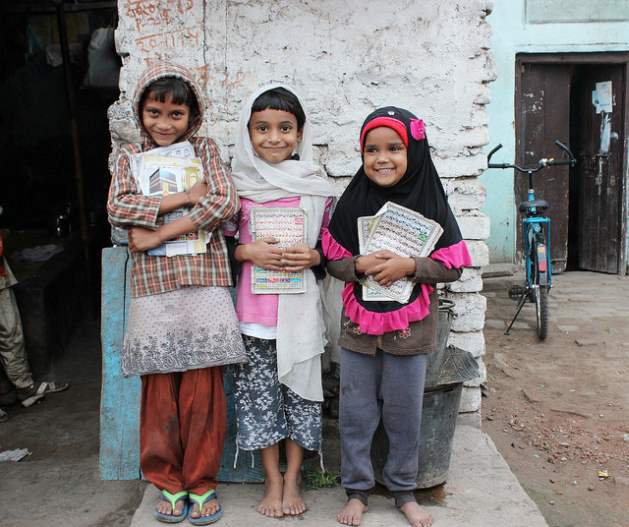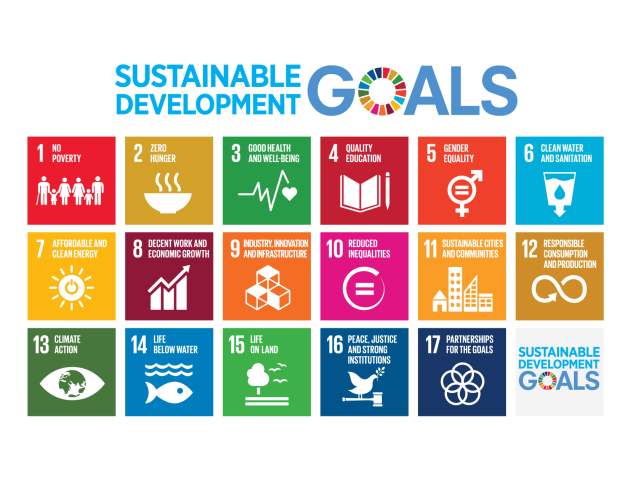Partnerships Key to Implementing 2030 Development Agenda

UNITED NATIONS, Aug 24 (IPS) - The UN's 2030 Agenda highlights the strong commitment to ending poverty in all its forms and dimensions, including by eradicating extreme poverty by 2030. It also emphasizes the determination to end hunger and to achieve food security as a matter of priority and to end all forms of malnutrition.
Fifteen years of implementing the Millennium Development Goals (MDGs) led to unprecedented progress in human development. Globally, the poverty target was achieved five years ahead of schedule. Over 700 million of the poorest were lifted from abject poverty and hunger, though progress in reducing hunger has been slower.
Strong economic growth in some large economies, in particular in China, contributed importantly to reaching the poverty goal, but in many parts of the world growth has been insufficiently rapid and insufficiently inclusive. Great progress was made in achieving universal primary education, for boys and girls. Child mortality was greatly reduced. Significant progress was made in reaching gender equality and women's empowerment, as well as in combating HIV/AIDS, malaria and other major diseases.
Yet, much more remains to be done to end the scourge of extreme poverty, illiteracy, hunger and malnutrition, pandemics, gender inequality and conflict. The latest data contained in the report of the Secretary-General "Progress towards the Sustainable Development Goals" (E/2016/75) shows that about 1.6 billion people still live in multidimensional poverty and nearly 793 million people suffer from hunger and 155 million children are stunted.
Maternal mortality and non-communicable diseases (responsible for nearly 70 per cent of deaths) are declining too slowly. Over 1 billion people are living without electricity, 663 million people lack access to clean water, 2.4 billion do not have adequate sanitation and more than half of the world's population still remains offline.
Nearly 70 per cent of the world's poor depend on natural resources for all or part of their livelihoods and many are suffering the consequences of depletion of natural capital and low prices on raw materials. The degradation of the productive assets of the poor, exacerbated by lack of access to modern infrastructure and digital economy, creates a poverty trap that reinforces the loop of further degradation and worsening poverty.
Poverty, nationally defined, exists in all countries. While its extreme manifestations are in low income countries, developed countries also need to address problems of poverty and malnutrition. Reducing by half the number of poor people as nationally defined (target 1.2) and ending all forms of malnutrition (target 2.2) will require developed and developing countries to take focused actions, including addressing the structural causes of poverty, hunger and malnutrition.
The emerging consensus in the international community today is that eradication of extreme poverty and hunger is possible in our lifetimes. Moreover, future prosperity will require that economic growth will no longer degrade the environment, and will be inclusive by ensuring the participation of vulnerable and marginalized groups in public life, production and decision making, especially by providing women and men with the same access to productive resources.
Social protection has proven to be a powerful tool to reduce poverty, food insecurity, and malnutrition, and empower people. It can also contribute to the achievement of various sustainable development outcomes, including in such areas as health, education, gender equality, reducing inequalities and inclusive growth.
With the overarching aspiration of getting people and planet closer together and leave no one behind, the 2030 Agenda is a unique opportunity to inspire global action for development worldwide, through inclusive innovation and multi-stakeholder partnerships.
Inclusion is at the core of the 2030 Agenda. According to the 2016 Global Sustainable Development Report, the pledge to leave no one behind relates closely to three important dimensions of the 2030 Agenda: poverty, inclusiveness and inequality. Inclusiveness speaks to the notion of empowerment and the principle of non-discrimination. It is reflected in the vision of a "just, equitable, tolerant, open and socially inclusive world in which the needs of the most vulnerable are met" and "a world in which every country enjoys sustained, inclusive and sustainable economic growth and decent work for all" (paragraphs 8 and 9 of the 2030 Agenda).
Making the inclusive world envisioned in the 2030 Agenda a reality will require innovation in policy-making and implementation. It will require rethinking economic development strategies and the manner, in which economic, social and environmental policies are conceived and delivered.
Evidence from the past decades shows that economic growth is necessary but not sufficient, to accelerate the reduction in poverty and hunger which also requires strong political commitment, an innovative, purposeful and coherent approach to policy making across sectors and shareholders, dedicated resources and accountability. This requires new policies, coordination mechanisms, approaches and business models above all a new mindset of all global actors.
There is general recognition within the international community that neither actor on the international development arena - Governments, the private sector or civil society - can fully solve the root causes of poverty alone. Each actor is only one part of the complex ‘fabric' which constitutes the sustainable development process. Therefore, for the whole ‘fabric' to hold together all actors must learn to partner or collaborate more effectively with each other.
The private sector continues to play an increasingly important role in creating future opportunities in the daily lives of the poor in developed and developing countries. Today, private businesses are operating on a massive scale and deepening their presence and reach within developing markets which have long been the traditional areas of focus of Governments, international aid agencies and civil society.
As companies intensify their focus upon identifying new commercial opportunities in these low-income markets, there are increasing opportunities for cooperation and overlap between Governments, civil society and the private sector interests to work productively as allies.
This convergence between the three sectors suggest that even though the private sector's principal role is wealth creation, Governments and civil society can work together with business to make markets better for the benefit of the poor and alleviate poverty, thus providing a primary route to long-term development and leading to a more prosperous life for communities currently living in poverty.
Businesses engage in partnerships with Governments and civil society in order to more effectively achieve their philanthropic, social investment, commercial initiative or core business goals. An increasing number of businesses set Corporate Social Responsibility and sustainability (economic, social and ecological) strategies and goals. At the local level, field operations of these businesses apply these strategies to their market context. They frequently engage Governments and civil society in various partnership models.

Depending on the level of engagement of partners and local market contexts, these partnership models may range from ‘sponsorships' (providing cash, products, in-kind gifts or pro bono work), to ‘marketing' (using company's core business infrastructure or personnel), to ‘capacity building' (know how or technology sharing), ‘brokering' (facilitating local partnerships and large scale initiatives, and matching product donations), to ‘advocacy' (issue driven partnerships and campaigns) and to creating new business opportunities or innovative solutions to sustainable development challenges.
Over the last two decades, partnerships have increasingly become an integral part of the work of many United Nations organizations. These partnerships have not only complemented the Organization's efforts to achieve its objectives but also contributed to its renewal by introducing new methods of work. This is one of the ways that the UN has responded to the challenges of globalization and growing influence of stakeholders in various fields of UN's work.
The partnerships range from interagency collaboration to partnerships between the United Nations and non-State actors, including businesses, foundations and other private-sector organizations, and are playing an increasingly important role.
However, within Governments, civil society and the United Nations, partnering with the private sector is still in its early stages. Although there are some successes in partnering, most activities are currently of limited scope and are opportunistic rather than strategic. Most actors are not currently leveraging their size and global reach to take full advantage of the immense private sector opportunities.
In order to achieve a partnering orientation, we need to make significant changes in our policies, strategies and organizations as well as in individuals in terms of how to think about achieving and delivering world actors' missions. Partnering orientation should become part of the vision of every actor in the international development arena.
Such an orientation would require the world's actors at all levels to embrace an ‘outward-facing' mindset. Mutual respect between partners, transparency and trust, mutual benefit, results oriented approach, responsibility and mutual accountability as well as complementarity in empowering communities, focusing on the greater well-being of the most needy and tackling the causes of poverty and hunger will be essential.
Innovative social business models substituting private gain by social welfare as the motive force of the economy and based on partnerships of governments, the private sector and civil society, are already prevalent in many capitalist economies. They are similar to non-profit organizations and crossing from "traditional" non-profit areas such as education, healthcare and cultural services to sectors of the economy engaged in trade and production of material commodities and commercial services. These enterprises also earn profits but these profits do not represent private gains on the part of the entrepreneurs. The motivation of the entrepreneurs is social welfare and their own private material gain.
Under the "Immortal Digital Ecosystem" (IDE), future 500,000 life cubes – a hybrid of community centers and charities - to be established by WOGC around the world will provide vital services to the poor and marginalized populations. They will also bring together partners from Governments, the private sector and civil society.
The main thrust of the life cubes will be providing social protection and inclusion for the most disadvantaged groups in the community, while providing its customers with highest quality ecologically safe products and commodities, and protecting the environment. The IDE project thus delivers on economic, social and environmental dimensions of the poverty and hunger-related SDGs.
To accelerate the achievement of the SDGs, Governments, international organizations, civil society and the private sector must join forces to ensure a sustainable future for all. The 2030 Agenda is relevant to all countries and all peoples, belongs to everyone, and its success will depend on the active implication and engagement of all actors and on reaching the furthest behind first, including through innovative social business models.
Meanwhile, focusing on the implementation of SDGs, the Permanent Mission of Zambia to the United Nations, in collaboration with WOGC, will host a High-level Global Meeting on "The Road to the Future of Sustainable Development: Moving from Commitments to Results through Inclusive Innovation" on Friday, August 25 at the United Nations Headquarters in New York.
© Inter Press Service (2017) — All Rights ReservedOriginal source: Inter Press Service
 Global Issues
Global Issues